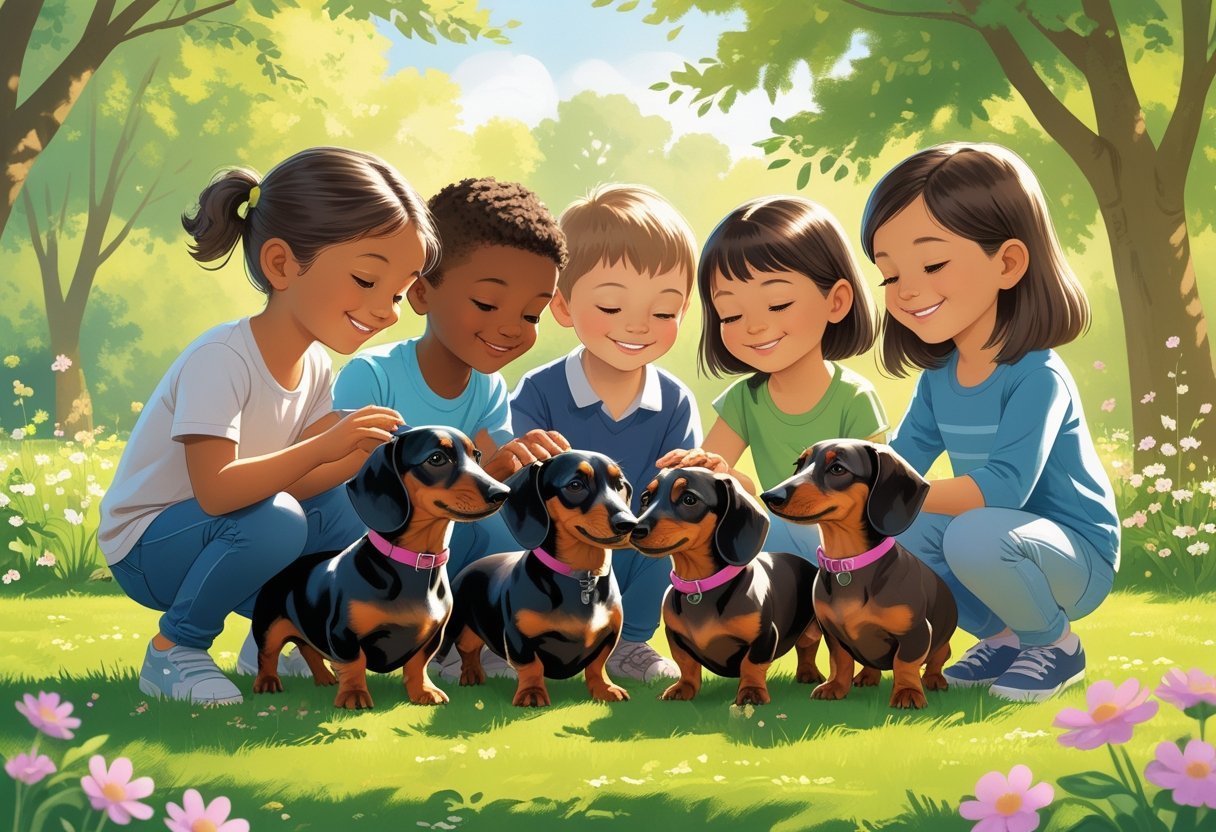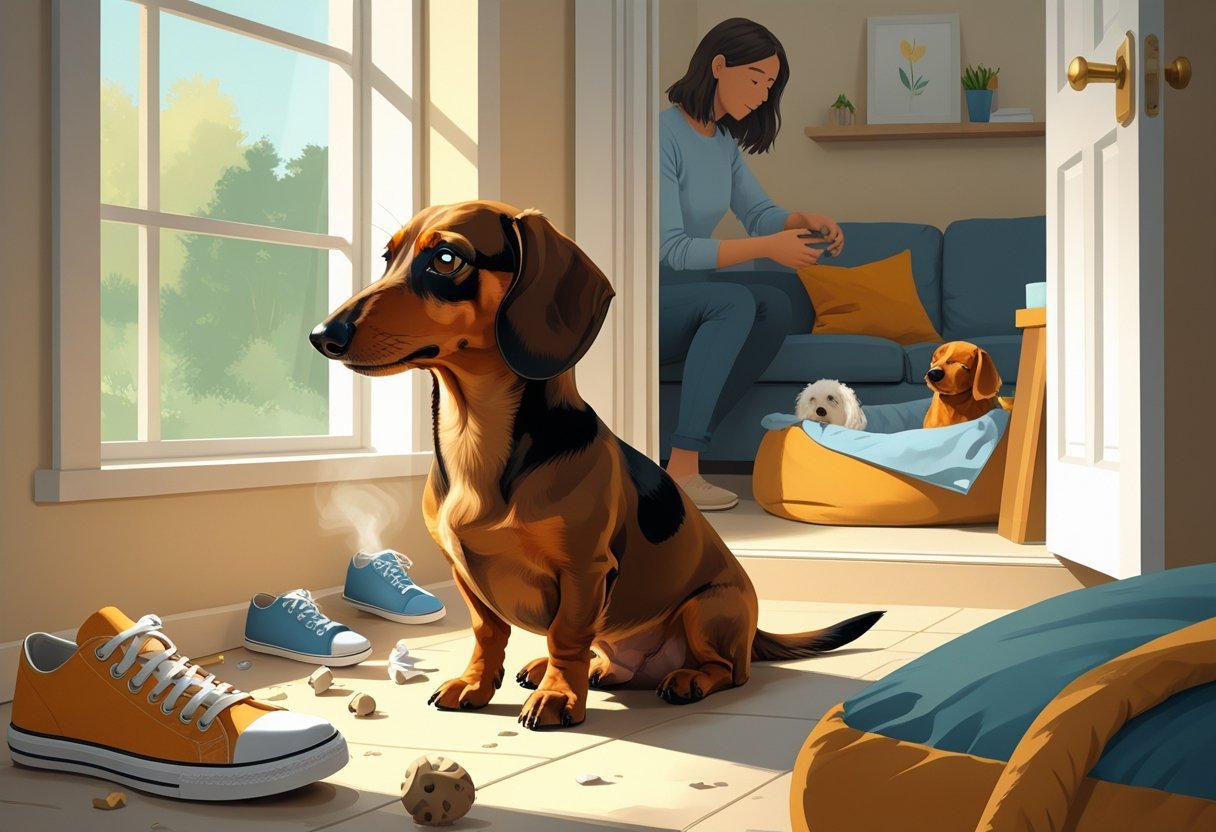Dachshunds have playful personalities and a look that’s hard to miss 🐶. They can make wonderful family pets, but a lot of parents wonder if these small, spirited dogs really fit in with kids 🤔. Dachshunds and children often form strong, loving bonds ❤️.
With the right supervision and training, dachshunds can form safe, loving bonds with children of all ages 👨👩👧👦.
These compact canines have their own quirks and needs 🐾. Parents should get to know their temperament before bringing one home 🏡.
Dachshunds can be protective and sometimes a bit stubborn 😅. That means you’ll need to manage things thoughtfully, especially if you’ve got little kids in the house 👶.
Their long backs make them physically vulnerable, so rough handling isn’t an option ⚠️.
Building a positive relationship between your dachshund and your children means teaching both sides how to interact 🤝. Kids need clear rules about gentle handling, while dachshunds benefit from early socialization and consistent training around kids 🎓.
Key Takeaways ✨
- Dachshunds can form strong bonds with children when proper supervision and mutual respect are established. 🐕
- Children must learn to handle dachshunds gently to protect their sensitive backs and avoid triggering defensive behaviors. 👧
- Consistent training, clear boundaries, and a safe home environment help create a harmonious relationship between dachshunds and kids. 🏡
🐾 Free Dachshund Care Guide
Download our free checklist to ensure your Dachshund stays happy, healthy, and well-loved!
Get Your Free Guide 🐶Understanding Dachshund Temperament
Dachshunds have personality traits that really shape how they interact with kids 🐾. Knowing these natural tendencies helps you keep things safe and positive at home 🏡.
Personality Traits of Dachshunds 🐕
Dachshunds are brave, curious, and smart ✨. They’ve got strong hunting instincts, which makes sense—they were bred to hunt badgers, after all.
This background explains their stubborn streak 😅. They’re usually loyal and form close bonds with their families ❤️.
Your dachshund will probably be:
- Alert and protective – they’ll bark when someone comes by 🔔
- Affectionate with family members 💕
- Playful if they get enough stimulation 🎾
- Independent thinkers who sometimes ignore commands 🤔
Despite their size, dachshunds have big personalities 🌟. They can be willful and test boundaries now and then 🚧.
Many dachshund owners say their dogs have a sense of humor and love interactive play 😄.

🥗 Wild Earth Vegan Dog Food – Gentle, Family-Friendly Nutrition
Plant-based recipe that keeps mealtimes calm at home—kind to sensitive Doxie tummies and easy for kids to help with under supervision.
- Stable formula helps prevent tummy upsets when children assist with feeding 🙂
- 100% plant-based ingredients support compassionate family values 🌿
- Simple portions make kid-assisted mealtimes clear and consistent 🥄
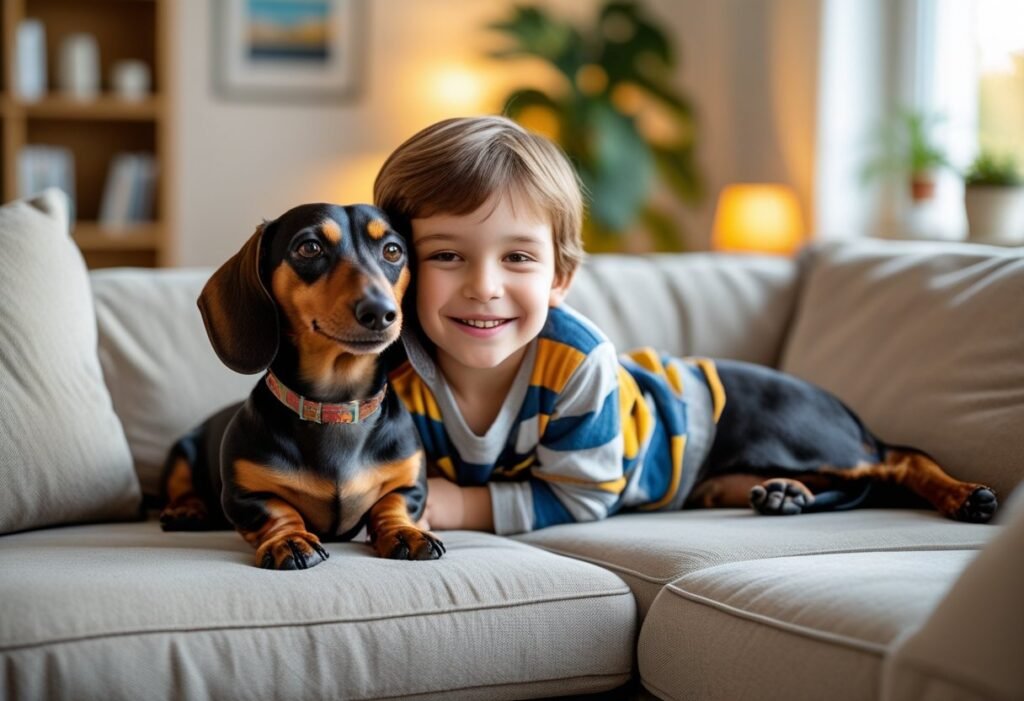
Behavioral Challenges With Children ⚠️
Dachshunds can develop behaviors that need careful management around kids 👶. Their hunting background may trigger chasing or nipping, especially when children run or scream 🏃.
Common challenges include:
- Possessiveness over toys and food 🧸
- Sensitivity to rough handling because of their long backs 🐾
- Barking or growling when startled 😮
- Snapping if they feel cornered or scared 😬
Teach your kids to respect the dachshund’s space and handle them gently 🤲. Never let children pick up dachshunds the wrong way—serious back injuries can happen 🚫.
Set clear rules for both your kids and your dog 📏. Supervise all interactions, especially with toddlers who may not know how to be gentle yet 👀.
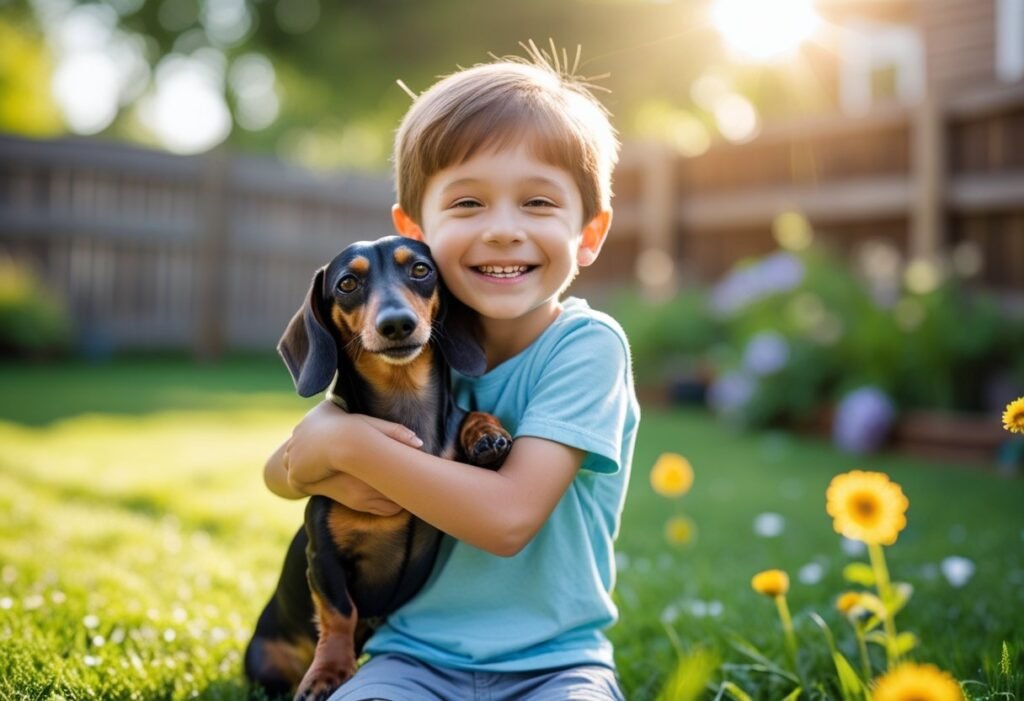
Age and Socialization Factors 🧩
A dachshund’s age and early experiences shape how they act around children ⏳. Puppies who meet kind, gentle kids during their key socialization period (3–14 weeks) usually do better later on 🐶.
Adult dachshunds who haven’t been around children may need slower introductions and more supervision 🐕🦺. Senior dachshunds can have less patience as they get older 👴.
Effective socialization includes:
- Controlled, positive meetings with children of different ages 👫
- Rewarding calm behavior around excited kids 🏅
- Teaching both the dog and children how to interact 📖
- Short, regular socialization sessions instead of overwhelming encounters ⏱️
Your dachshund’s background matters too 🐾. Rescue dogs with unknown histories may need more time and patience to feel comfortable around kids ❤️.
Are Dachshunds Good With Children?
Dachshunds can make wonderful family pets if you train and socialize them properly 🐾. Their playful nature and loyalty give them real potential for meaningful bonds with kids ❤️.
Their physical build, though, does require some special attention ⚠️.
Suitability for Families 👨👩👧👦
Dachshunds bring a lot of positives to family life 🌟. They’re loyal, affectionate, and often develop strong bonds with their people 💕.
Their small size works well in apartments or smaller homes 🏡. But their long backs mean you’ve got to be careful—rough handling can lead to injuries 🚫.
Teach your kids to never pick up a dachshund without help, since that can cause serious spinal issues ⚡.
Because they were bred as hunting dogs, dachshunds can be determined and stubborn 🎯. With consistent training and clear boundaries, you can manage these traits in a family setting 📏.

🧠 Brain Training for Dogs – Fun, Gentle Skills for Kids & Doxies
Step-by-step, reward-based games that teach calm manners, impulse control, and safe play around children—perfect for building trust at home.
- Short, kid-friendly sessions reduce rough play and overexcitement 🎯
- Teaches helpful cues like “gentle,” “leave it,” and “settle” for safety ✅
- Clear plans make it easy for parents to supervise and stay consistent 📄
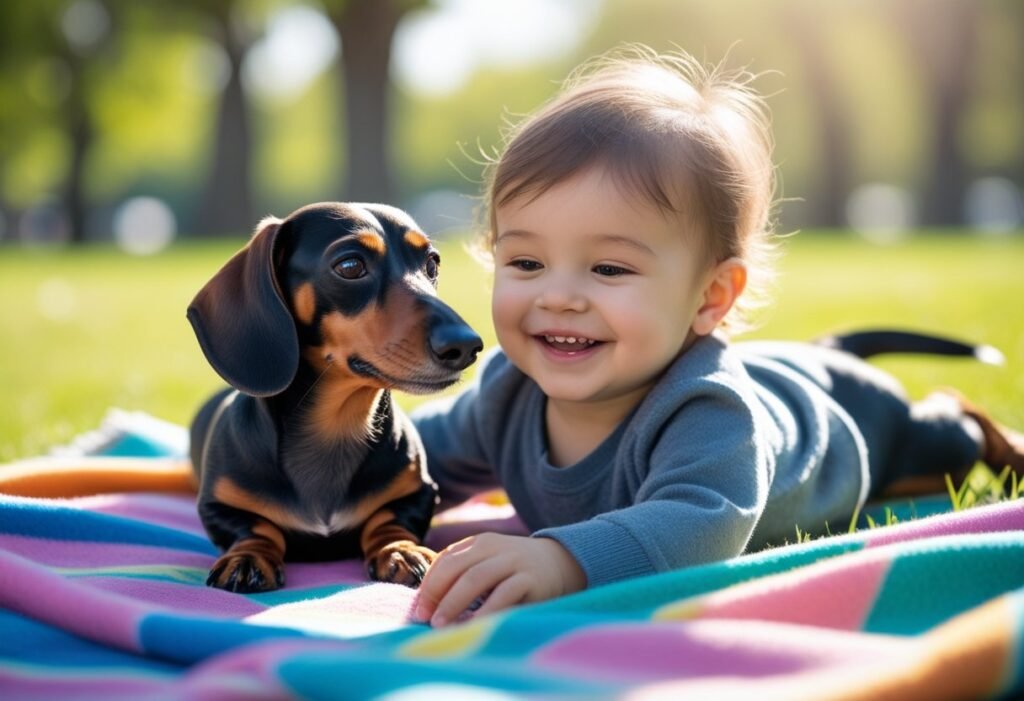
Compatibility by Age Group 🧒👦👩
Toddlers (1-3 years): Dachshunds need close supervision with very young children. Toddlers might accidentally hurt them, and quick movements can trigger the dog’s prey drive or startle them. 👶
School-age children (4-12): This age group usually works well with dachshunds. Kids can learn how to handle them properly and respect boundaries, but you still need to supervise at first. 🎓
Teenagers: Older kids often make great companions for dachshunds. They can help with training, walks, and daily care. 🐕🦺
Whatever the age, teach your children to respect the dog’s space and notice signs of discomfort 👀. That’s the foundation for mutual respect 🤝.
Common Myths and Realities 🧐
Myth: Dachshunds are too fragile for homes with children.
Reality: Their backs do need protection, but dachshunds are pretty sturdy when handled right 💪.
Myth: All dachshunds are snappy with children.
Reality: Temperament varies. Well-socialized dachshunds often enjoy spending time with kids 😊.
Myth: Dachshunds can’t be trained to be gentle with kids.
Reality: Most dachshunds learn good behavior around children with the right training and positive reinforcement 🎉.
Early socialization really helps 🌱. Exposing puppies to gentle, positive interactions with kids builds confidence and good habits 🐶.
Adult dachshunds who didn’t grow up with children might need extra time and patience to adjust ⏳.
Safety Considerations for Kids and Dachshunds
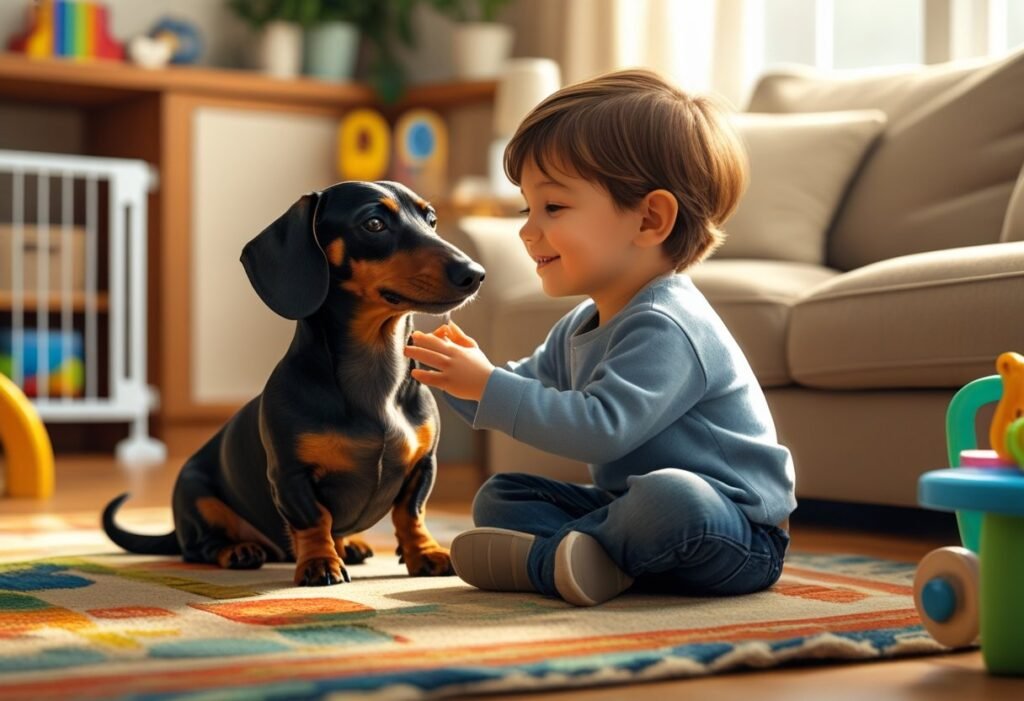
Creating a safe space for dachshunds and kids to interact means setting boundaries and modeling the right behaviors 🐾. Both sides need some guidance to keep things positive and safe 🤝.
Recognizing Warning Signs ⚠️
Dachshunds give warning signs when they’re uncomfortable 👀. Watch for these signals:
- Stiff body posture or freezing 🧊
- Lip licking or yawning when not tired 😬
- Whale eye (showing the whites of their eyes) 👁️
- Lowered tail or tucking it 🐕
- Growling or showing teeth 😠
Teach your kids to spot these cues 🧒. If your dachshund shows stress, have your child back away and give the dog space 🚶.
Don’t punish a dachshund for growling—it’s their warning system 🔔. If you punish them for it, they might skip the warning and bite next time 🚫.

🥣 ChefPaw Fresh Food Maker
- Fresh, gently cooked meals you control—great for sensitive Doxie tummies 🙂
- Easy batch portions so kids can help under supervision 🥄
- Steady routines reduce mealtime begging and overexcitement 🕒

⏱️ Petlibro Auto Feeder
- Scheduled feedings keep mealtimes calm around kids ⏱️
- Precise portions support a healthy weight for long backs ⚖️
- App control lets parents adjust meals without crowding the bowl 📱
Establishing House Rules 🏡
Clear rules help everyone know what’s okay and what’s not 📏. Try these basic guidelines:
For children:
- No pulling tails, ears, or fur 🚫
- Don’t disturb the dog while they’re eating or sleeping 💤
- No picking up the dog without an adult 🙅
- Use gentle touches and quiet voices 🤲
For dachshunds:
- Have a “dog-only” space where they can retreat 🛏️
- Set clear rules about furniture 🪑
- Keep to regular feeding and walking schedules ⏰
Put these rules somewhere visible 📋. Go over them often and stick to them. Consistency helps your dachshund feel secure, and kids know what’s expected ✅.
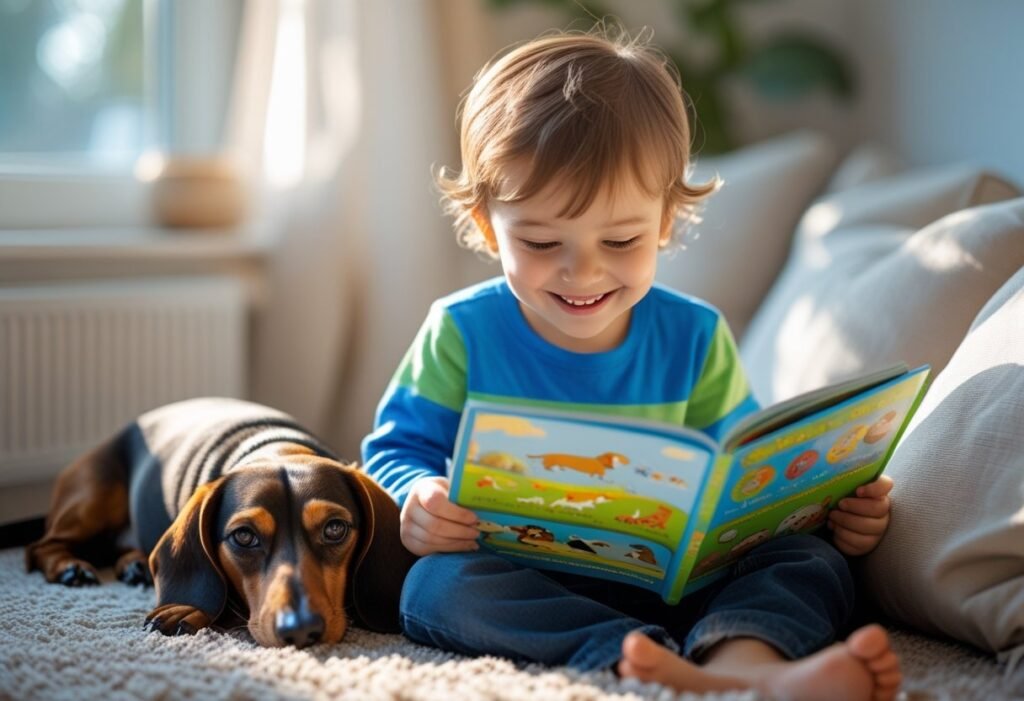
Supervised Playtime Guidelines 🎮
Never leave young kids alone with your dachshund, no matter how gentle either seems 👶. Always supervise their time together 👀.
Safe play activities include:
- Gentle games of fetch with safe toys 🎾
- Hide and seek with treats (great for positive associations) 🍪
- Simple training sessions where kids can give commands 🎓
Coach your kids to stay calm during play 🧘. Loud running or screaming can trigger a dachshund’s prey drive or make them anxious 😮.
Limit play sessions to 15–20 minutes, then give everyone a break ⏳. Create a “time-out” signal that kids can use if they notice the dog needs space—this helps them learn to watch for the dog’s cues 🐕.
Teaching Children to Interact With Dachshunds
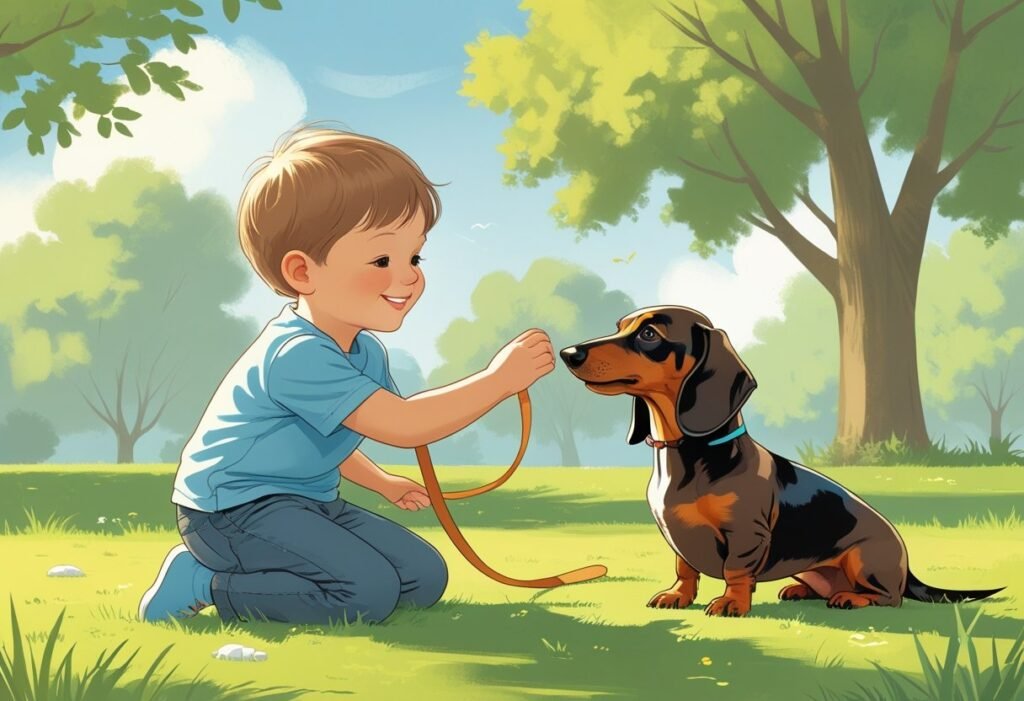
Teaching kids how to interact with dachshunds lays the groundwork for a safe, respectful relationship 🐾. The right guidance helps prevent accidents and builds a loving bond between your child and your doxie ❤️.
Educating Kids on Respectful Handling 🎓
Kids really need to know that dachshunds have sensitive backs ⚠️. Their long bodies make them prone to injury if picked up the wrong way 🐕.
Show your child how to lift a dachshund: one hand under the chest, the other supporting the back legs 🙌. Never let them scoop the dog up without proper support 🚫.
Let your child know that approaching from above can make a dachshund feel threatened 👀. Encourage them to crouch down to the dog’s level instead 🤲.
Pulling ears, tails, or fur? That hurts the dog and is absolutely off-limits ❌. Little reminders like this go a long way ✨.
Set up simple rules such as “gentle petting only” or “no tight hugs” 💕. These are easy for kids to remember 📝.
Sometimes, practicing with stuffed animals before handling the real dog helps 🧸. Kids love a bit of role-play anyway 🎭.

🛡️ The Swiftest Pet Insurance Comparison
- Compare Dachshund-focused coverage in minutes for peace of mind ⏱️
- See IVDD and back-care options explained clearly for parents 🛡️
- Transparent costs help families plan with confidence 💡

🖼️ Purr and Mutt Personalized Dachshund Portraits
- Turn your Doxie-and-kids moments into keepsake art 🎁
- Celebrates gentle bonding and positive routines at home 💖
- Lovely addition to playrooms, reading nooks, and family walls 🏡
Safe Approaches to Play 🎮
Dachshunds love playtime, but their backs can get hurt if things get too wild 🐾. Steer your kids away from rough games or anything that encourages jumping 🚫.
Instead, suggest these safer play options:
- Fetch with soft toys on the floor 🎾
- Gentle tug-of-war with safe toys 🪢
- Hide-and-seek using treats or favorite toys 🍪
- Training games with simple commands 🎓
Stick around to supervise until everyone knows the rules 👀. If play gets too rough or your dachshund looks stressed, use a “time-out” signal ⏳.
Your doxie should always have a retreat spot, like a crate or bed, where kids aren’t allowed to follow 🛏️. Dogs need their own space sometimes, just like people do 🌟.
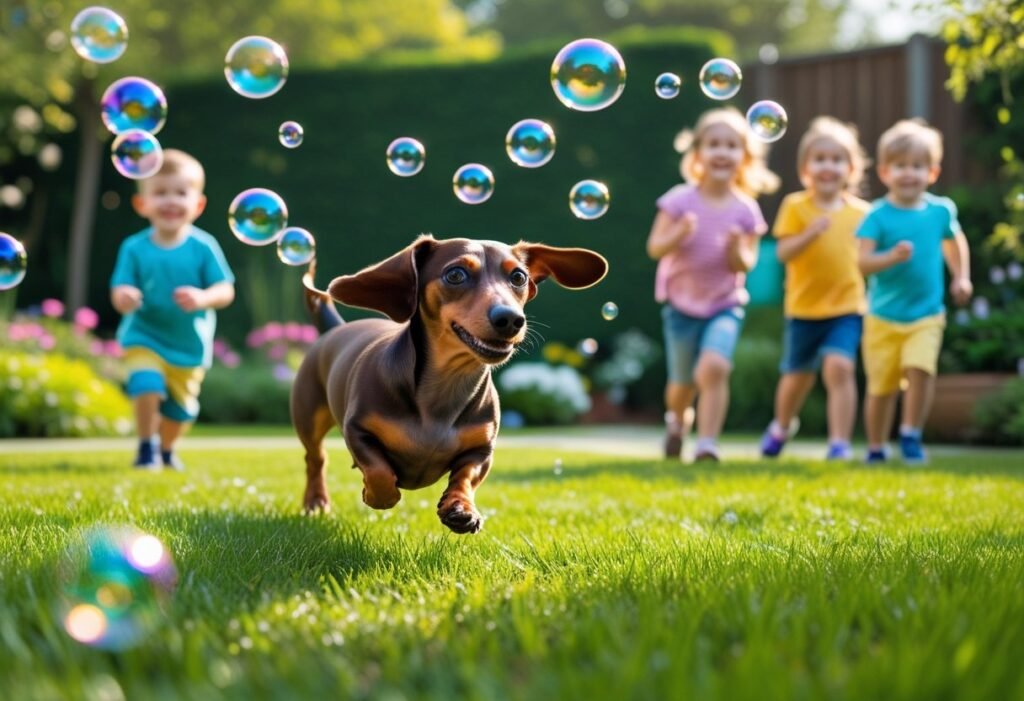
🎉 Grab your free Dachshund care checklist!
Building Trust and Understanding 🤝
Kids can learn to read dachshund body language—it’s not as mysterious as it seems 🐶. Teach them to notice signs of discomfort like these:
| Signal | Meaning |
|---|---|
| Stiff body | Feeling tense or uncomfortable 🧊 |
| Whale eye (showing whites) | Anxious or stressed 😟 |
| Lip licking | Nervous 😬 |
| Growling | Clear warning – needs space 🚫 |
If your dog shows any of these, have your child back off and give space 🚶. That’s how trust grows 🌱.
Let your child help with feeding or hand out treats (with you watching, of course) 🍽️. It’s a simple way to build positive associations 👍.
Go for short, happy interaction sessions instead of long ones ⏱️. Quality over quantity, every time 🌟. Don’t forget to praise both your child and your dog when things go well 🎉.
Training Dachshunds for Positive Child Interactions
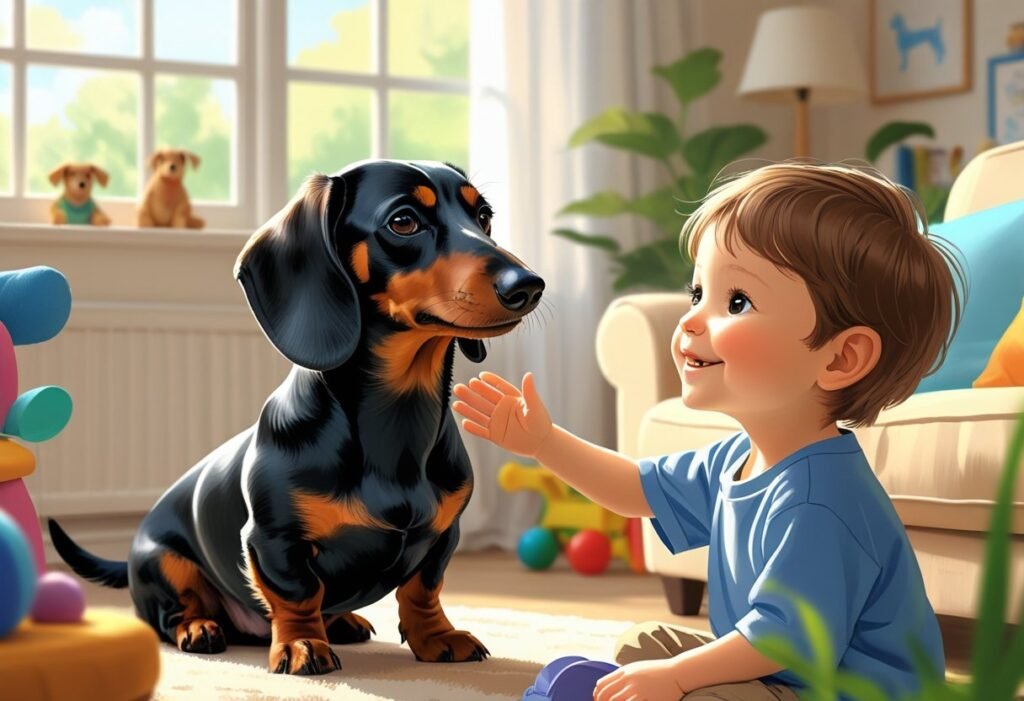
Teaching your dachshund to be safe around kids takes some planning 🐾. A little training now sets the stage for a peaceful home later 🏡.
Early Socialization Techniques 🌱
Start socializing your dachshund with kids as soon as you can ⏳. Puppies between 3–14 weeks soak up new experiences like sponges 🐶.
Set up short, positive meetings with calm children of different ages 👧👦. Keep it brief at first—no need to rush 🕒.
Key socialization activities:
- Let kids offer treats with an open palm 🍪
- Practice gentle petting while you supervise 🤲
- Expose your dachshund to normal kid sounds—laughter, even crying 🎶
- Reward calm behavior with treats 🏅
Keep a close eye on these interactions 👀. If your dachshund seems uncomfortable, stop right away 🚫. Don’t force it—bad experiences can stick ⚠️.

🧪 AnimalBiome Gut Health Test Kit
- Simple at-home test with clear steps parents can supervise 🙂
- Insights that help explain tummy issues behind grumpy moments around kids 🐾
- Vet-style report guides gentle changes without guesswork 📄

🌿 Zomalka Calmpet Drops
- Natural support for noisy, busy family moments without heavy drowsiness 🌿
- Helpful during supervised kid-dog introductions and play breaks ⏱️
- Dropper dosing keeps parent-led routines simple and consistent 👨👩👧👦
Obedience Training Essentials 🎓
Basic commands really help when kids and dachshunds share a home 🏠.
Essential commands to work on:
- “Sit” and “Stay”—these stop jumping on kids 🙆
- “Leave it”—keeps your dog from snatching toys 🧸
- “Go to place”—gives your dog a safe spot to retreat 🛏️
- “Gentle”—teaches a soft mouth for taking treats 🤝

Use treats, praise, and a bit of petting as rewards 🌟. Dachshunds focus best with short, frequent sessions—think 5–10 minutes tops ⏱️.
Older kids can join in basic training (with your help) 👩👦. This way, both sides learn to respect each other 🤗.
Desensitization to Child Behaviors 🔊
Kids can be loud, unpredictable, and sometimes don’t know dog boundaries 🙉. Dachshunds need to get used to this.
Try controlled exposure to typical kid behavior:
- Drop toys near your dog (not on them!) 🎲
- Have someone act out running or jumping like a child 🏃
- Play recordings of kid sounds, starting soft and turning up gradually 🔈
Pair these things with treats and kind words 💕. If you notice stress—like lip licking or whale eye—pause and give your dog a break 🛑.
Teach a “retreat command” so your dachshund can leave if overwhelmed 🐕. Make sure there’s a kid-free zone where your dog can chill out undisturbed 💤.
Fostering a Loving Bond Between Dachshunds and Children
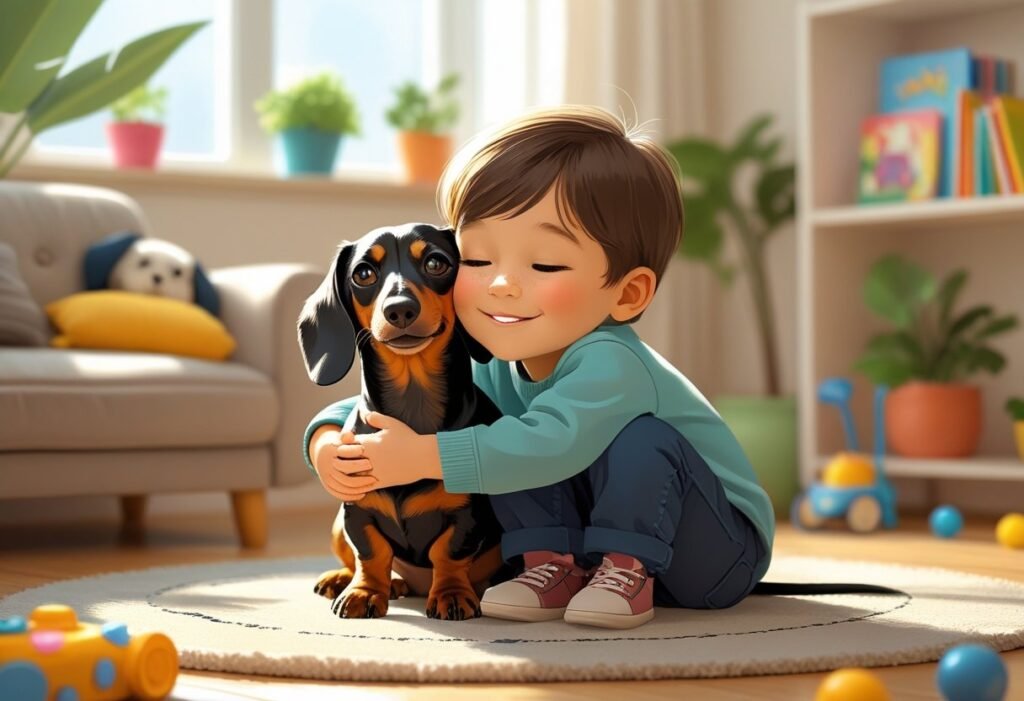
Building a close relationship between dachshunds and kids takes patience and a bit of structure 🐾. When it works, it’s pretty special for everyone involved ❤️.
Encouraging Gentle Affection 💕
Show kids how to approach dachshunds quietly 🤫. Sudden moves or loud voices can spook these sensitive pups 😮.
Teach gentle petting—long strokes down the back, not patting the head ✋. Most dachshunds prefer this, honestly 🐕.
Set up a “safe zone” for your dog, like a bed or crate, and make sure kids know not to bother them there 🛏️. Boundaries matter 📏.
When your child handles the dog gently, praise them 👏. Give your dachshund a treat for calm behavior around kids 🍪. Positive vibes all around ✨.
Stick close during interactions, especially with little kids 👶. Even the sweetest dachshund has limits, and it’s better to step in early if needed 👀.

📹 Petcube Cam 360
- Full-room view so you can check playtime with kids from anywhere 📹
- Two-way talk to soothe your Doxie or cue “settle” during excitement 🔊
- Night vision makes quiet bedtime checks simple 🌙
📍 Tractive GPS Dog Tracker
- Live GPS for door-rush moments and backyard escapes during kid traffic 🏡
- Safe zones with instant alerts around home, school runs, and parks 🔔
- Activity tracking helps plan gentle walks with children 🚶
Family Activities for Bonding 👨👩👧👦
Family walks with your dachshund are great for bonding 🚶. Everyone gets exercise and some shared time together 🌳.
Let kids help with simple training sessions 🎓. Commands like “sit” or “stay” are easy for them to practice ✅.
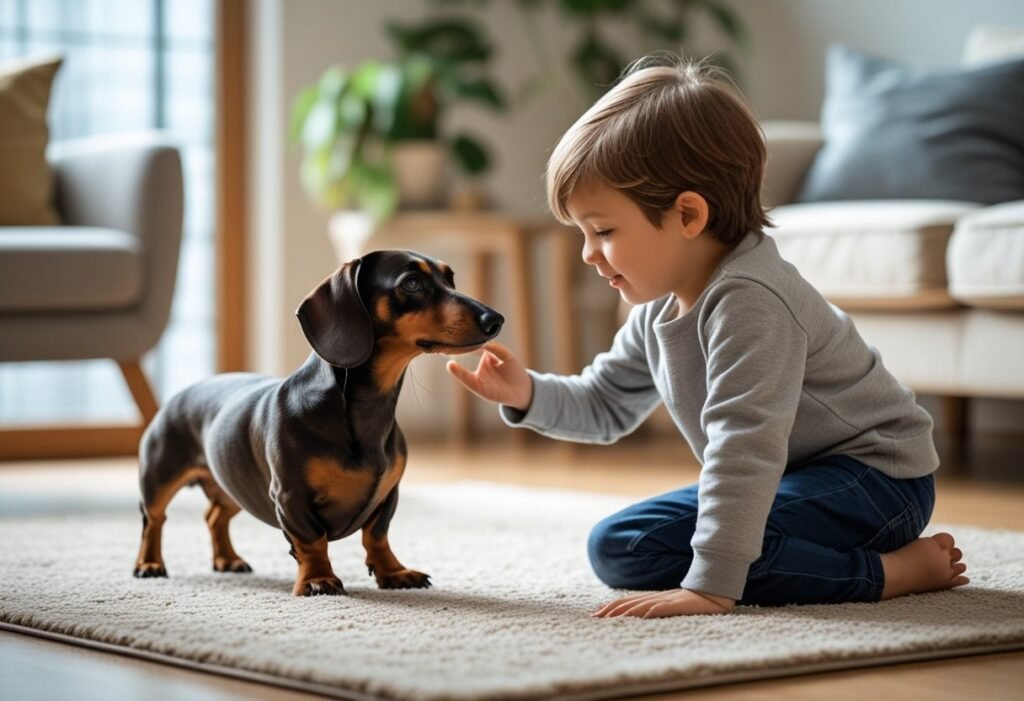
Child-Appropriate Training Activities:
- Kids can hold treats during training 🍪
- Let them give commands after you demonstrate 🎤
- Play fetch games, but always supervise 🎾
- Try scent games—hide treats around the house and let your kids help your dachshund find them 🕵️
Reading together with your dachshund nearby? Surprisingly calming for everyone 📖, and it helps your dog see kids as a source of peace 🧘.
Promoting Mutual Responsibility 🤝
Give your kids pet care tasks that fit their age 🗓️. Even little ones can help fill the water bowl if you supervise 💧.
Sample Responsibility Chart by Age:
| Age | Appropriate Responsibilities |
|---|---|
| 4–6 | Helping measure food, supervised water refills 🥣 |
| 7–9 | Feeding with reminders, brushing, short leash walks 🐕🦺 |
| 10+ | Regular feeding, longer walks, basic grooming ✂️ |
Make a feeding and walking schedule your kids can follow 📋. Visual charts work well for kids who can’t tell time yet ⏰.
Show your kids how to spot when your dachshund feels uncomfortable 👀. This helps prevent misunderstandings before they start 🚫.
Celebrate small milestones 🎉—maybe your child remembers to feed the dog without a reminder, or your dachshund starts seeking out your child for cuddles 🐾. Those moments matter 💖.
Managing Common Challenges
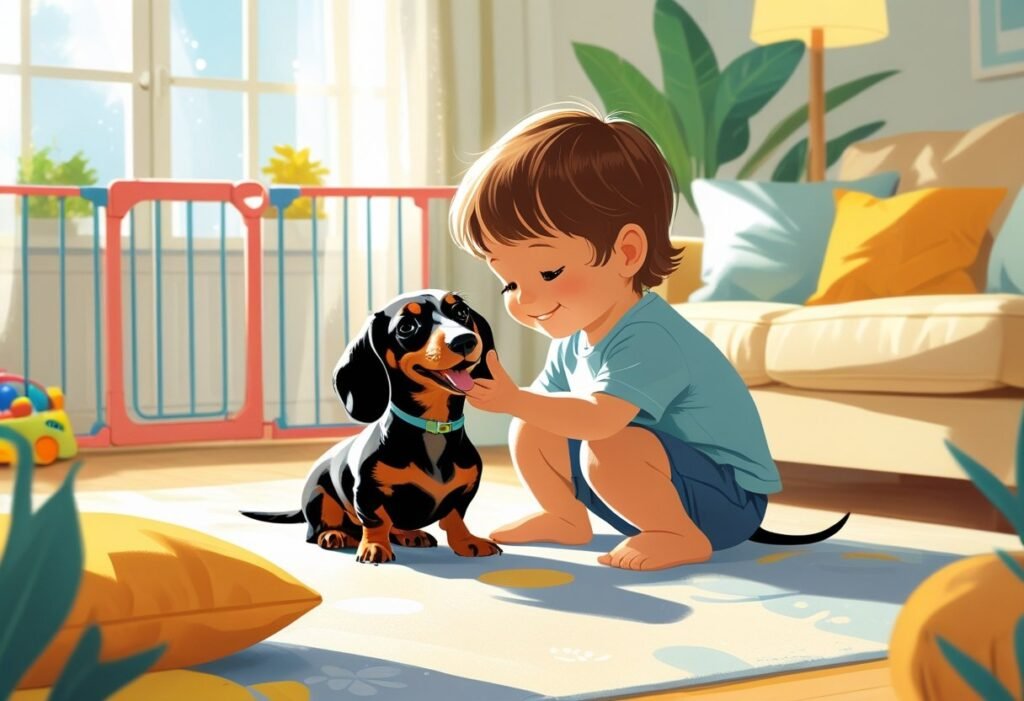
Having dachshunds and kids together isn’t always smooth sailing ⛵. You’ll need patience and some consistency, but it’s worth it ❤️.
Handling Jealousy and Resource Guarding 🧸
Dachshunds sometimes get possessive over toys, food, or even people 🍽️. If your dog growls when a child comes near their stuff, pay attention 👀.
Try these steps to ease resource guarding:
- Teach your dog to “trade” items for treats 🍪
- Don’t let kids take anything straight from your dachshund’s mouth 🚫
- Feed your dog in a separate spot where they won’t be disturbed 🛏️
- Reward calm behavior when kids are nearby 🏅
Supervise until you’re sure things have improved 👩👦. If guarding gets worse, it might be time to call a trainer for help 📞.

🛏️ Majestic Pet Orthopedic Bed
- Soft, cozy spot for family nap time and cuddles 💤
- Supports your Doxie’s spine and joints while kids play nearby 🐾
- Washable cover for quick cleanup after play sessions

🧴 Pride + Groom Grooming Tools Kit
- Perfect for teaching kids gentle grooming routines 💛
- Soft, safe tools designed for sensitive Dachshund skin
- Transforms grooming into a calm, bonding activity
Addressing Fear or Timidity 😟
Some dachshunds get overwhelmed by energetic kids ⚡. If your dog hides, trembles, or pants a lot, they might be stressed 😰.
Set up safe spaces for your dachshund, like a crate or behind a baby gate 🚪. Leave the door open so they can come and go freely 🐾.
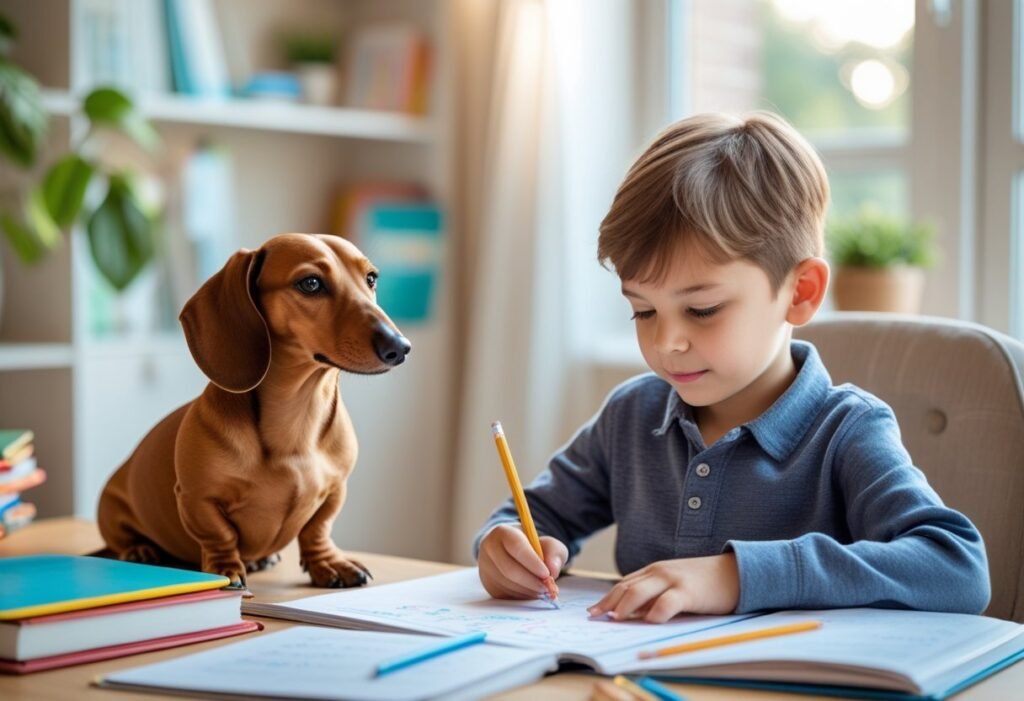
Show kids how to approach calmly and pet gently 🤲. Quiet voices help a lot 🤫. If your dog seems nervous, don’t force anything 🚫.
Try positive association training:
- Pair kids’ presence with treats 🍪
- Start with short, calm interactions 🕒
- Increase exposure slowly as your dog gets more comfortable 🌱
Stick with it 💪. Reward brave moments, but always respect your dog’s comfort zone 🛑.
Resolving Playtime Conflicts 🎮
Sometimes play between dachshunds and kids gets too rowdy 😅. Set clear rules for everyone during playtime 📏.
Safe Play Guidelines:
- No chasing the dachshund 🏃
- No pulling tails or ears 🚫
- No roughhousing or wrestling 🤼
- Always supervise play sessions 👀
Teach your child to notice when your dachshund needs a break 🐕. Panting, walking away, or showing the whites of their eyes means it’s time to stop ⚠️.
Redirect overexcited energy with toys 🎾. Tug and fetch games work well and keep things structured 🪢.
Give your dachshund regular exercise outside of kid playtime 🚶. A tired dog is usually a calmer dog when the family’s together 🌟.
Creating a Safe Home Environment
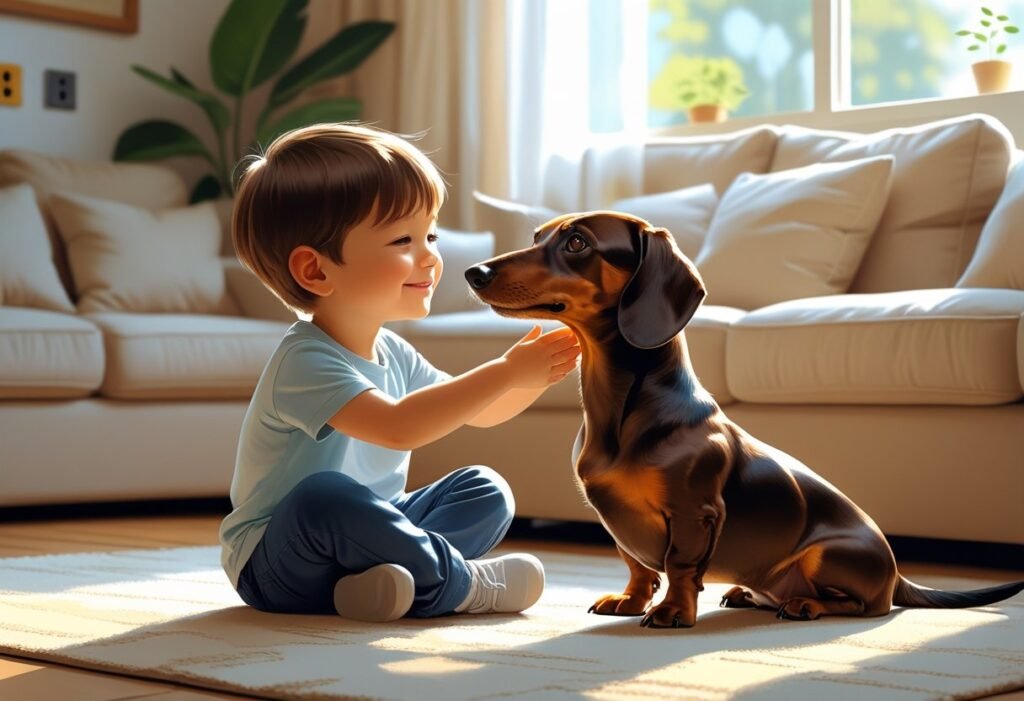
Setting up your home the right way keeps your dachshund and kids safe 🏡. A bit of planning goes a long way to prevent accidents and help everyone get along 🤝.
Child-Proofing and Dog-Proofing Spaces 🔒
Secure low cabinets with child-proof locks so your dachshund can’t get into cleaning supplies or medications 🧴. Those things are just as risky for dogs as they are for kids—maybe even more, since dachshunds can be sneaky 🐕.
Put your dachshund’s food and water bowls somewhere toddlers can’t reach 🥣. This keeps little hands out of the bowls and helps avoid resource guarding problems 👶.
Keep trash cans covered or stash them in a cabinet 🚮. Dachshunds are persistent when it comes to garbage, and there’s always something dangerous in there—chicken bones, plastic, who knows what else ⚠️.
Wrap up electrical cords or use cord protectors 🔌. Puppies, especially, love to chew, and nobody wants an electrical shock situation 😬.
Pick up small toys that could become choking hazards for your dachshund 🧸. LEGO pieces, marbles, tiny accessories—dogs don’t know the difference between toys and snacks 🚫.
🏡 Family-Friendly Essentials for a Happy Doxie & Kids Bond
- 💧 Petlibro Water Fountain — Keeps your Doxie hydrated throughout playtime and ensures kids don’t have to refill bowls constantly.
- 🍖 Petcube Bites 2 — Help your children bond safely with your Dachshund by rewarding good behavior remotely and teaching gentle play.
- 🪜 Majestic Pet Stairs — Prevent accidents and make climbing easier for your Dachshund, keeping playtime safe even around excited kids.
- 🧬 AnimalBiome Gut Restore Capsules — Support healthy digestion for consistent energy, making your Doxie more playful and comfortable around family.
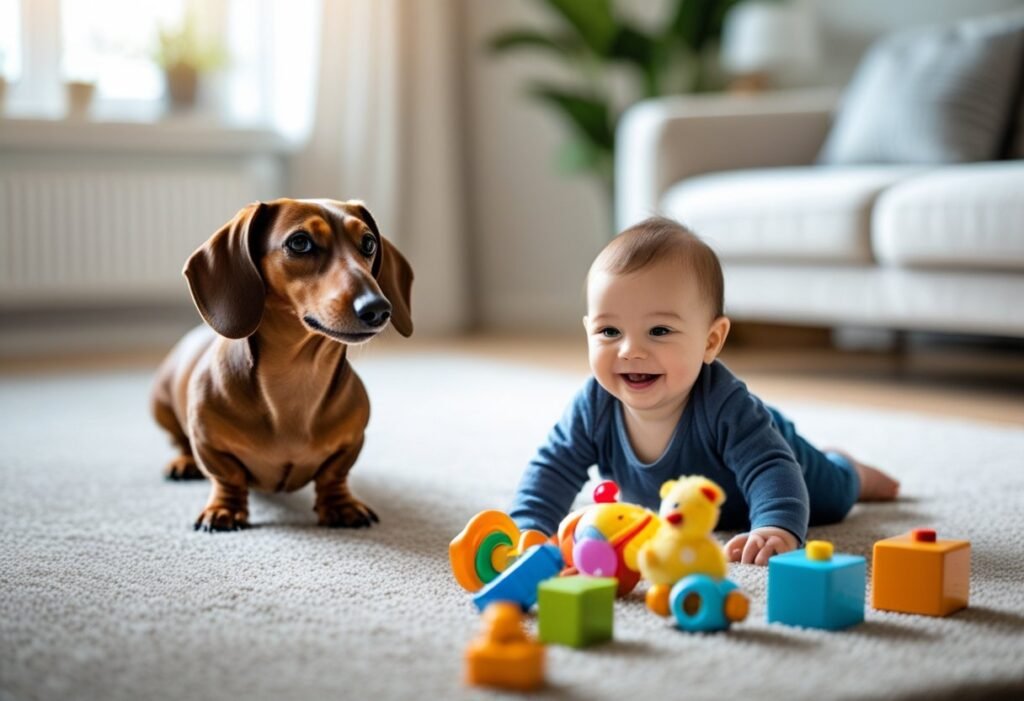
Designated Rest and Play Areas 🛏️🎾
Set up a dachshund safe zone—maybe a crate with a cozy bed or a gated corner with favorite toys 🐾. Your dog needs a spot to escape when things get overwhelming 😮💨.
Let your kids know the safe zone is off-limits 🚫. If your dachshund heads there, it means “please leave me alone”—and kids should respect that 🙅.
Create a play area for supervised time together 🧩. Clear out breakables and make sure there’s space for gentle games 🤗.
Use baby gates to block off stairs 🚪. Dachshund’s long backs don’t mix well with climbing or jumping—spine injuries are a real risk ⚡.
Offer chew toys made for dogs 🪢. This saves your shoes and the kids’ stuff from getting shredded 👟.
When to Seek Professional Help
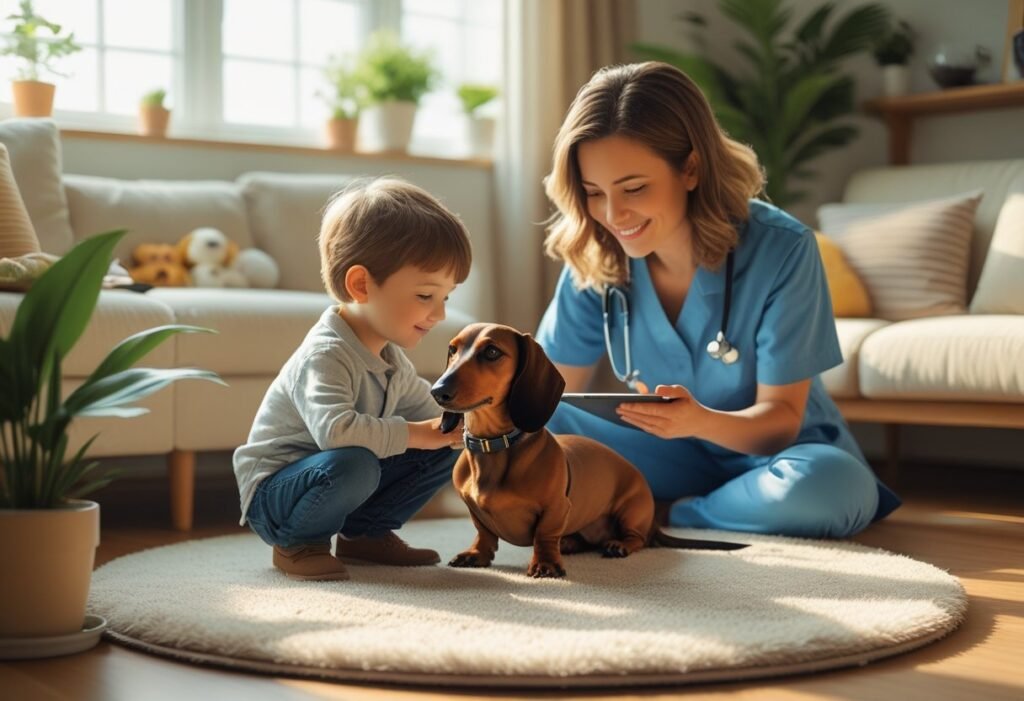
Most dachshunds and kids do fine together, but sometimes you’ll need a pro to step in 👩⚕️. Knowing when to ask for help matters more than people realize 💡.
Identifying Behavioral Red Flags 🚩
Watch for signs your dachshund might need professional help 🐕. If your dog keeps growling, snapping, or nipping at your child, that’s a big red flag—don’t just hope it’ll go away ⚠️.
Resource guarding—like getting snappy over food or toys—can get out of hand fast if you ignore it 🍖. Take it seriously from the start ❗.
If your dachshund acts extremely fearful or anxious when your child comes near, that’s not normal 😟. It’s time to check in with a pro 📞.
Sudden behavior changes—like a friendly dog turning withdrawn or snappy—could mean pain or illness 🩺. Get a vet involved if you notice this 🐾.
Don’t wait until after someone gets bitten 🚫. Jumping in early can stop things from escalating ⏳.
💛 Safe, Calm & Confident Family Companions — Essentials for Dachshunds & Kids
- 🎽 Embark Pet Adventure Harness – Ideal for family walks, this secure and comfy harness keeps your Doxie steady even when kids hold the leash.
- 🦮 Coastal Pet Harness (IVDD Version) – A back-safe option that helps kids learn to handle your Dachshund gently during training and play.
- 🌿 Innovet PurCBD Oil – Calm your Doxie’s nerves during noisy family moments or when kids are learning how to interact respectfully.
- 🫧 King Klean Dog Shampoo – Gentle and non-toxic formula perfect for weekly family bath time, leaving your Dachshund’s coat soft and clean.
- 👕 Dog is Good Apparel & Gifts – Celebrate family love and your Doxie’s joyful spirit with positive, heartwarming apparel for everyone at home.
🐾 Build trust, teach kindness, and enjoy every family moment with these safe, loving essentials made for Dachshunds and their favorite humans.
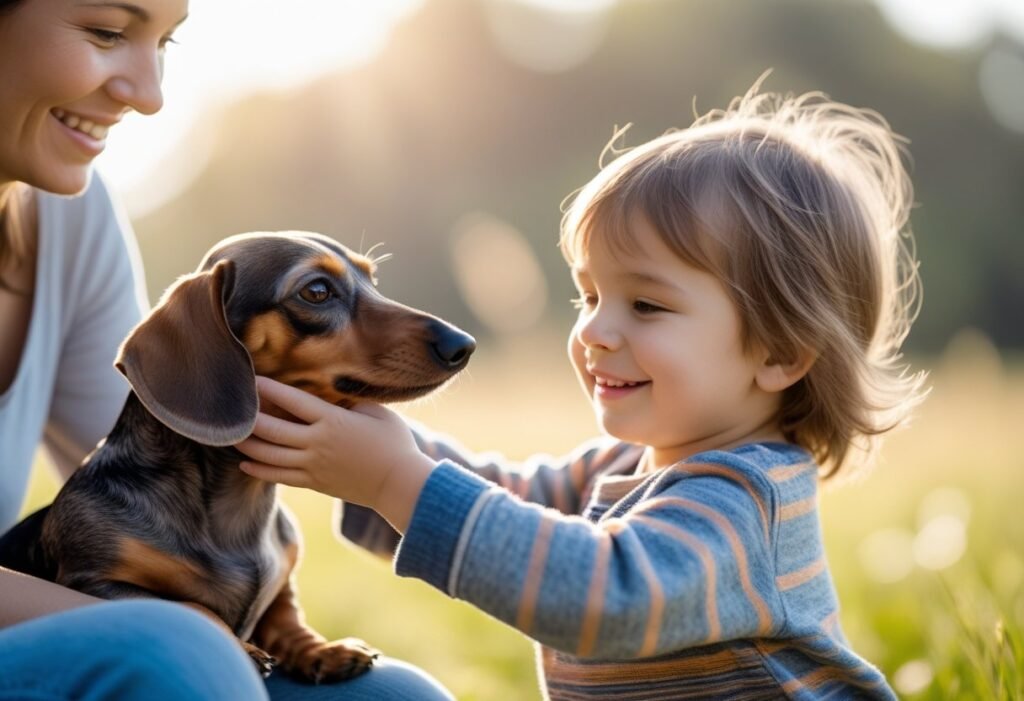
Finding Trainers and Child-Animal Specialists 🎓
Look for trainers with certified credentials from groups like the Certification Council for Professional Dog Trainers (CCPDT) or the International Association of Animal Behavior Consultants (IAABC) 📜.
Try to find someone who’s worked with:
- Small breed behavior issues 🐾
- Child-dog relationships 👶🐶
- Positive reinforcement training 🏅
Veterinary behaviorists have extra training for complicated cases 🧠. They’re basically vets with a specialty in animal behavior 🩺.
Ask trainers how they handle kids in the training process 🗣️. The best ones will include your family and not just focus on the dog 👨👩👧👦.
Lots of trainers offer online consults now 💻, so you can get help even if nobody local has the right experience 🌍.
🐾 Don’t Miss Out!
Download our free Dachshund care guide to keep your furry friend happy and healthy.
Get Your Free Guide 🐶Frequently Asked Questions
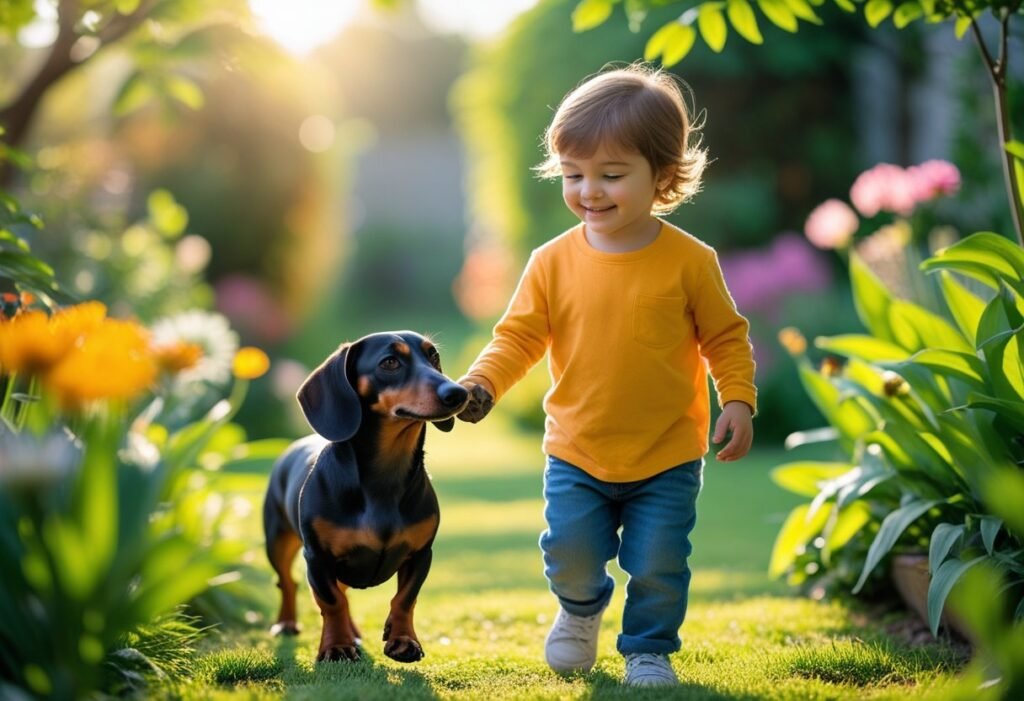
Dachshunds and kids can have great relationships if there’s good training, supervision, and respect 🐾. Here are some of the questions parents ask most about dachshunds and children 👨👩👧👦.
Are dachshunds suitable for families with young children? 👶🐶
Dachshunds can fit in with families, but they need proper socialization 🌱. Their size makes them more likely to get hurt if kids play rough ⚠️.
They usually bond with gentle, respectful kids who get boundaries 💕. Dachshunds are loyal and protective, which is awesome for families if you help channel it 🏡.
Always supervise when dachshunds are with kids under six 👀. That’s just common sense for everyone’s safety ✅.
What is the best way to introduce a dachshund to a child? 🤝
Start with short, supervised meetings in a quiet spot 🌿. Let your dachshund go to the child—don’t force anything 🚫.
Coach your child to stay calm, speak softly, and move slowly 🗣️. Giving treats with a flat hand helps avoid accidental nips 🍪.
Increase time together as trust grows 💛. Never leave a new dachshund alone with kids until you’re sure everyone knows what’s okay and what’s not 🔒.
How can children be taught to safely interact with dachshunds? 🎓
Teach kids to respect your dachshund’s space and spot warning signs—growling, backing away, or getting stiff means “back off” 🚦.
Show them how to pet gently and skip sensitive spots like the back ✋. Dachshunds’ spines are delicate, so lifting should be done the right way or just left to adults 🩺.
Set up a safe zone for your dachshund to retreat to 🛏️. Make it clear to kids: if the dog’s there, leave it be 🚪.
Can dachshunds tolerate rough play from kids? 🎲
Honestly, dachshunds don’t handle rough play well 😬. Their backs can get hurt easily if things get wild ❌.
Guide kids to play gentle games like fetch or hide-and-seek with treats 🎾. These are fun and safe for everyone 🥳.
Supervise all play and stop anything that could stress or hurt the dog 👀. Better safe than sorry, right? 👍
What should be done if a dachshund shows signs of aggression towards children? ⚠️
If your dachshund acts aggressive, get a professional on board right away 📞. Look for a certified trainer or animal behaviorist who knows dachshunds 🎓.
Never use physical punishment for aggression—it only makes things worse 🚫. Figure out what’s causing the problem and work on safer behaviors instead 🔄.
Keep the dachshund and kids apart while you’re working on the issue 🚧. Safety always comes first ❤️.
How can a dachshund’s protective instincts align with family dynamics involving children? 🏡
Dachshunds come with a strong protective streak 💪. They were bred as hunting dogs, so guarding their “pack” feels natural to them 🐕.
With some training and socialization, you can guide these instincts in a positive direction 🌟. It’s not always easy, but it’s worth the effort 💯.
Set up clear leadership at home so your dachshund knows where it stands in the family 📋. That way, the dog won’t get confused about who’s in charge 👑.
Get your kids involved in activities with your dachshund 🎉. Toss in some treats, maybe a game or two 🍪🎲, and your dog will start seeing the kids as important members of the pack 👨👩👧👦.

